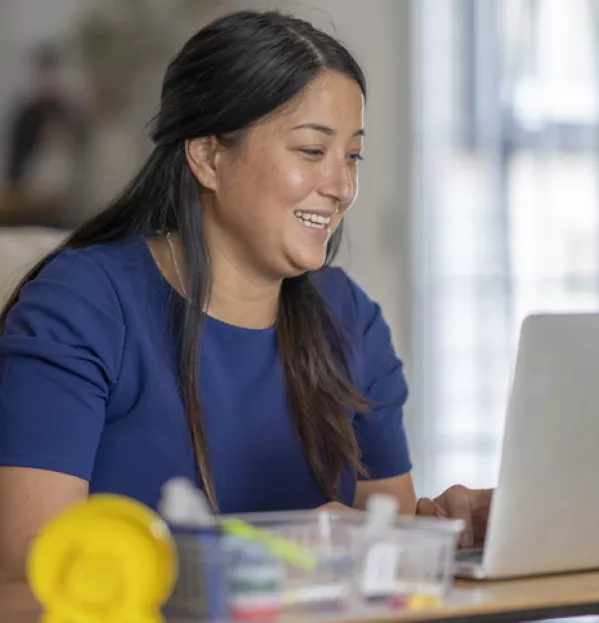- Home
- Pastoral
- Tips & Techniques
- Online safety: Why educating parents matters
Online safety: Why educating parents matters

I once taught a student whose mother used to switch off the WiFi at 9pm each night. And yet, he would still come to school tired and could be heard bragging about how great he was at Call of Duty. When I asked how this could be the case, he had a simple answer: “I have the neighbour’s WiFi password - we all do.” Moral ambiguity aside, it was an elegant solution.
This scenario also highlighted a common reality: when it comes to the online world, children are often far more adept than their parents.
As educators, we need to recognise this and build resilience not only for our pupils but their guardians too. If we ensure children are accessing the internet in a positive way outside of school, we have the potential to curtail issues that inevitably have an impact on pupils inside the school.
While there are a number of important areas to highlight to parents, I think these are the big four.
- How to teach online safety to tech-savvy students
- Interoception: why it matters in your classroom
- SEND: How to teach online safety inclusively
Filters
Filters are amazing and can set healthy, age-appropriate boundaries for free on any device connected to the home WiFi. These can be set through a phone call to any internet provider and updated as children grow. Updates are incredibly important to gradually increase exposure and allow young people to build resilience as they mature.
Make sure that parents are aware that any devices with their own data sets, like phones, will need their filters set separately. And remember to reassure parents that they can set passwords to override the filter system so they don’t miss out on any of the film releases that would be less suitable for their 10-year-old.
Safe search engines
For under 10s, setting the homepage to a safe search engine is an excellent way to overcome mishaps. We have all had a seemingly innocent image search go awry, and by using child-friendly sites like Smiggle, YouTube Kids and KidRex, we can reduce that risk substantially. Some large web search providers do have safe search options but, be aware, these are very easy to switch off.
As for secondary age students, it’s all about reinforcing the importance of responsibility. Leaning over a teens shoulder at all times or attempting to monitor their screens using apps is less likely to create a healthy relationship and more likely to teach them how to creatively sneak past you.
Algorithms
Have you ever bought a pair of jeans and then been bombarded with ads for jeans for the next three months? That’s an algorithm. They collect information and send us materials that will make us tick. While this may be great for our wardrobe, it can create problems regarding echo chambers and fake news.
Reinforce to parents the importance of learning about the world from mainstream media channels rather than stories from social media or news suggestions from their phones. This can build a more balanced knowledge of the world within the home and help parents recognise when they or their children are straying into conspiracy theories and bias debates, and instead form healthy informational environments.
Social media
Social media is often the centre of a young person’s world and while many parents may have a Facebook account, they may be less au fait with the newer, young models.
For younger children, encourage parents to play around on social media sites alongside their child, learn together how to block and apply appropriate privacy settings to form a positive online space.
For older children, reinforce the message of accountability. What happens on the internet can be difficult to erase. Many young people have no interest in “friending” their parents, and respect of space can build trust, but if you have any concerns, ensure that the parents feel they can have an open a supportive dialogue to air out any worries.
So how do we reach parents to ensure they are clued up on the above? Well, there are a couple of opportunities that already exist in the school calendar: open days and parents’ evenings.
Don’t bother having a separate session, parents’ work schedules will often clash with any day you pick no matter how hard you try. In the knowledge that most will attend parents’ evening, use it. Add a 30-minute assembly to walk them through an internet safety workshop.
When welcoming parents of new potential students during open days, do the same. This can not only maximise uptake but also build resilience from day one in the homes of young people joining a new place of education. Parental education can be a minefield but, in this case, it may save a lot of headaches in the long run.
Elizabeth Kitto is the prevent education officer for Barking and Dagenham
You need a Tes subscription to read this article
Subscribe now to read this article and get other subscriber-only content:
- Unlimited access to all Tes magazine content
- Exclusive subscriber-only stories
- Award-winning email newsletters
Already a subscriber? Log in
You need a subscription to read this article
Subscribe now to read this article and get other subscriber-only content, including:
- Unlimited access to all Tes magazine content
- Exclusive subscriber-only stories
- Award-winning email newsletters



